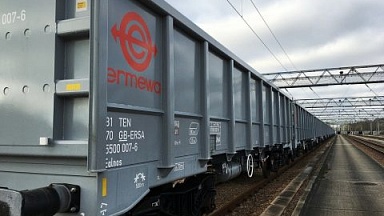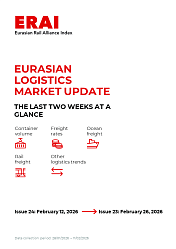Known as the hub of small commodities, Yiwu sees more than 2.1 million types of products sent to over 230 countries and regions around the world.
Despite a recent COVID-19 rebound, the flow of goods remained unimpeded.
«Yiwu has become ’quiet’ for the epidemic control, but the trains cannot stop,» said Feng Xubin, chair of the local freight operator Yiwu Tianmeng Industrial Investment Co. Ltd. Roaring engines and fully-loaded carriages from Yiwu mirrored a robust and busy China-Europe freight train service.
The latest data showed the number of train trips last month surged by 11 percent year on year to hit a record 1,517, with shipments of 149,000 20-foot equivalent units (TEUs) of goods.
While the world is reeling from the pandemic and volatility, the freight trains have offered a secure and reliable channel for trade and economic cooperation.
Starting operations in 2011, the China-Europe freight trains now reach 196 cities in 24 European countries through 82 routes, transporting more than 50,000 types of goods including IT products, automobiles and parts, clothes, grain, wines, coffee beans, and timber.
By the end of July, the total number of train trips had surpassed 57,000, with shipments of 5.3 million TEUs of goods worth nearly 300 billion U.S. dollars.
The train service offers a new logistics channel between Asia and Europe that operates around the clock, has a large carrying capacity, and is green, low-carbon and safe, Xu Jianping, an official of the National Development and Reform Commission, told a press conference on Thursday.
The role of the China-Europe freight trains was even more prominent amid the pandemic.
Since the COVID-19 outbreak, some 109,000 tonnes of anti-pandemic products had been sent to Europe through the train service as of the end of July. While sea and air transportation were hit hard, it effectively guaranteed the stability of international industrial and supply chains.
Moreover, the train trip only costs one-fifth of air transportation and takes a quarter of the time required by shipping.
The China-Europe freight train service has emerged as «a passage of life» for the global anti-pandemic fight, observers said.
As a flagship project under the Belt and Road Initiative, the train service has brought tangible benefits and win-win results for countries along the routes and has enjoyed great popularity.
A report, released Thursday by the office of the leading group on advancing Belt and Road development and China State Railway Group Co., Ltd., said the train service improved regional opening-up, expanded economic and trade exchanges, deepened international industrial capacity cooperation, and facilitated the improvement of people’s well-being in countries along the routes.
While China’s inland places saw their export-oriented industries boom, more European products were also brought to Chinese markets and European cities including Poland’s Lodz and Germany’s Duisburg became more competitive international logistics hubs.
Looking forward, the China-Europe freight trains will continue to run on tracks of win-win cooperation and promote common development.
For better train service, China has vowed to upgrade weak rail sections and port stations to address transport bottlenecks, establish international cooperation networks, and strengthen support for new business models including cross-border e-commerce.
The train service faces both opportunities and challenges, but China is ready to work with countries along the routes to promote its high-quality development, making greater contributions to building a community with a shared future for humanity and pushing forward economic and social development, Xu said.




